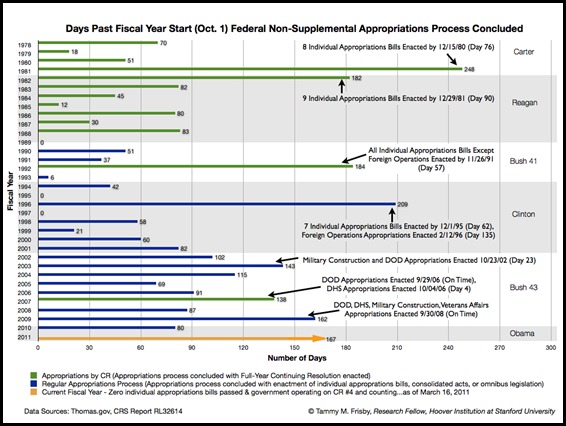Stepping back from the policy and political decisions of this budget battle in Washington, I wanted to know how the current appropriations process, with its excessive tardiness (we're 167 days past the start of the fiscal year) and sole reliance on Continuing Resolutions (no regular appropriations bills have been enacted), compares to how the process has operated over the last several decades, since the major budget process reforms of the mid-1970s.
I put together a snapshot of the last three decades of the federal appropriations process in the graph below. There is much to say about this, but for now, I want to make this point: The federal budget process has been breaking down and might finally have collapsed entirely. You can click on the chart to see a larger version.
Yes, this is not the most extended appropriations fight we've had. FY 1981, 1982, 1992, and 1996 saw longer periods until the final appropriations were made, either by regular appropriations measures or Full-Year Continuing Resolutions. But in all four of those years, at least two-thirds of the 12-13 appropriations bills were enacted by 90 days into the fiscal year.
That era of appropriations seems downright functional compared to what has happened in the last decade.
It has become standard operating procedure for Congress and the president to miss the start of the fiscal year - by a lot, if you think two months or more is a lot. (And I do.) Since 2000, it has taken at least 60 days past October 1 to conclude the appropriations process by enacting the final individual appropriations bills or consolidated or omnibus acts. And during this time, there have been four budget battles, including this current one, exceeding 120 days. A striking feature of the process during these four years (FY 2003, 2007, 2009, 2011) is that, unlike the negotiations of FY 1981, 1982, 1992, and 1996, Congress and the president managed to enact only the Defense and Homeland Security-related appropriations bills (very early in the fiscal year) and then proceeded to have a protracted wrangling about the entire rest of the budget.
Legitimate ideological differences and partisan politics are a big part of the current budget mess. But looking at where we've been heading over the last 30 years, the budget process itself seems to be failing. Maybe that's because the process as it exists today wasn't built to withstand the politics of a hyper-partisan and highly-polarized era. If that's the case, that's all the more reason to start looking seriously at proposals for budget process reform.







